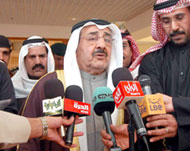New Kuwaiti cabinet sworn in
Kuwait’s new cabinet has been sworn in amid strong criticism by liberals angry that reformist former ministers were excluded from the government line-up.

The 16-member cabinet was sworn in during a session chaired by Amir Sabah al-Ahmad al-Sabah who urged the new government to “push for development in the country… and to enforce the law,” the KUNA news agency reported.
The cabinet, headed by the emir’s nephew Prime Minister Sheikh Nasser Mohammad al-Ahmad al-Sabah, now formally assumes its powers as it does not need a vote of confidence in parliament.
Speaker Jassem al-Khorafi told reporters that the new ministers will take the oath in parliament on February 20 to become ex-officio members of the house, in line with the Kuwaiti law.
Parliament will also hold a special session on the same day to approve the nomination of Shaikh Nawaf al-Ahmad al-Sabah, a half-brother of the emir, as a new crown prince, Khorafi said.
New faces
Besides the prime minister, there are five new faces in the cabinet where members of the ruling Al-Sabah family maintained their hold on the key ministries of interior, defence, energy and foreign affairs.
 |
|
Al-Khorafi (C) said ministers will |
In the first meeting after being sworn in, the new cabinet approved a decree appointing the emir’s elder son, Shaikh Nasser Sabah al-Ahmad al-Sabah as minister to the emiri court.
The strength of Islamists was increased to three ministers in the new cabinet, up from two in the previous government.
But two leading liberal ex-ministers, Abdullah al-Taweel (commerce and industry) and Faisal al-Hajji (social affairs and labour), were excluded from the new formation.
“Reformist ministers, who were the target of attacks by corrupt elements, were excluded without justification,” said Khaled al-Mutairi, secretary general of the National Democratic Alliance, a coalition of the main liberal groups.
“At the same time, ministers with corruption allegations have been retained,” Mutairi told AFP.
Succession crisis
Shaikh Nasser, 65, replaced 76-year-old Shaikh Sabah, who had been prime minister since 2003 after becoming emir following the ouster by parliament of former ailing ruler Shaikh Saad al-Abdullah al-Sabah.
The unprecedented ouster followed a crisis over succession after the death on January 15 of emir Jaber al-Ahmad al-Sabah.
The government will serve until the next general election in July 2007.
The Gulf state of Kuwait sits on 10% of proven global oil reserves and has a native population of just under one million people, as well as 1.9 million foreigners.